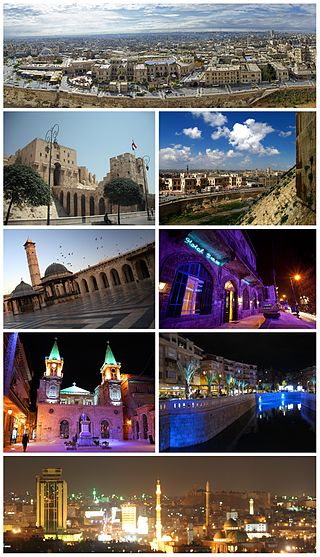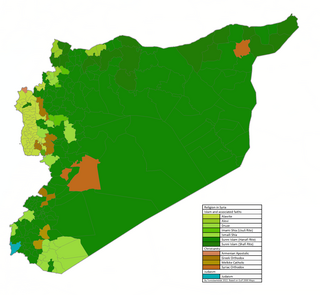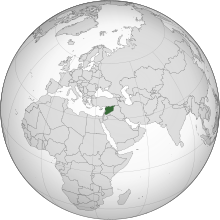
Squatting is the action of occupying an abandoned or unoccupied area of land or a building, usually residential, that the squatter does not own, rent or otherwise have lawful permission to use. The United Nations estimated in 2003 that there were one billion slum residents and squatters globally. Squatting occurs worldwide and tends to occur when people find empty buildings or land to occupy for housing. It has a long history, broken down by country below.

Aleppo is a city in Syria, which serves as the capital of the Aleppo Governorate, the most populous governorate of Syria. With an estimated population of 2,098,000 residents as of 2021, it was Syria's largest city until its population was surpassed by Damascus, the capital of Syria, the largest in Syria's northern governorates and also one of the largest cities in the Levant region.

Assyrians in Syria also known as Syriacs are an ethnic and linguistic minority that are indigenous to Upper Mesopotamia, the north-eastern half of Syria. Syrian-Assyrians are people of Assyrian descent living in Syria, and those in the Assyrian diaspora who are of Syrian-Assyrian heritage.
The Armenians in Syria are Syrian citizens of either full or partial Armenian descent.

Syria, officially the Syrian Arab Republic, is a country in West Asia located in the Eastern Mediterranean and the Levant. It is bounded by the Mediterranean Sea to the west, Turkey to the north, Iraq to the east and southeast, Jordan to the south, and Israel and Lebanon to the southwest. It is a republic that consists of 14 governorates (subdivisions). A country of fertile plains, high mountains, and deserts, Syria is home to diverse ethnic and religious groups, including the majority Arabs, Kurds, Turkmens, Assyrians, Circassians, Armenians, Albanians, Greeks, and Chechens. Religious groups include Sunnis, Christians, Alawites, and Druze. The capital and largest city is Damascus. Arabs are the largest ethnic group, and Sunni Muslims are the largest religious group. Syria is now the only country that is governed by Ba'athists, who advocate Arab socialism and Arab nationalism.
Al-Hajar al-Aswad is a Syrian city just 4 km (2 mi) south of the centre of Damascus in the Darayya District of the Rif Dimashq Governorate.

Religion in Syria refers to the range of religions practiced by the citizens of Syria. Historically, the region has been a mosaic of diverse faiths with a range of different sects within each of these religious communities.

The National Museum of Aleppo is the largest museum in the city of Aleppo, Syria, and was founded in 1931. It is located in the heart of the northern city on Baron Street, adjacent to the famous Baron Hotel and near the Bab al-Faraj Square and Clock Tower. The majority of the museum's exhibitions are devoted to the archaeology of Syria, with most of the finds coming from archaeological sites of the northern part of the country.

Armenian–Syrian relations are foreign relations between Armenia and Syria. Armenia has an embassy in Damascus and a consulate general in Aleppo. In 1997, Syria opened an embassy in Yerevan. Syrian Foreign Minister Farouk al-Sharaa visited Armenia in March 1992.
Syrians in Lebanon refers to the Syrian migrant workers and, more recently, to the Syrian refugees who fled to Lebanon during the Syrian Civil War. The relationship between Lebanon and Syria includes Maronite-requested aid during Lebanon's Civil War which led to a 29-year occupation of Lebanon by Syria ending in 2005. Following the outbreak of the Syrian Civil War, refugees began entering Lebanon in 2011.

The history of Syria covers events which occurred on the territory of the present Syrian Arab Republic and events which occurred in the region of Syria. Throughout ancient times the territory of present Syrian Arab Republic was occupied and ruled by several empires, including the Sumerians, Mitanni, Assyrians, Babylonians, Egyptians, Hittites, Canaanites, Phoenicians, Arameans, Amorites, Persians, Greeks and Romans. Syria is considered to have emerged as an independent country for the first time on 24 October 1945, upon the signing of the United Nations Charter by the Syrian government, effectively ending France's mandate by the League of Nations to "render administrative advice and assistance to the population" of Syria, which came in effect in April 1946.
The following is a timeline of the Syrian Civil War from January to July 2015. Information about aggregated casualty counts is found at Casualties of the Syrian Civil War.

Although Syria has some of the oldest cities in Western Asia, such as Damascus and Aleppo, tourism in Syria has greatly reduced as a result of the Syrian War, that began in 2011 and is ongoing, and its associated refugee crisis. Tourism has been further impacted by the outbreak of COVID-19 starting in March 2020. The international economic sanctions imposed on Syria and the sharp drop in the value of the Syrian pound also adversely impact tourism in Syria. The Ministry of Tourism is the responsible government department.
Return of refugees of the Syrian civil war is the returning to the place of origin (Syria) of a Syrian refugee or an internally displaced Syrian, and sometimes a second-generation immigrant, or over-stayer, a rejected asylum seeker, who is unable or unwilling to remain in the Syrian refugee camps established in Turkey, Lebanon, Jordan, Egypt, and other countries.
Squatting is the occupation of unused or derelict buildings or land without the permission of the owner. From the 17th century onwards, there have been waves of squatting in Ukraine. In the 21st century, squatting has been practiced by different groups such as artists, anarchists, Ukrainian nationalists, displaced Crimean Tatars returning to the region and refugees created by the annexation of Crimea by the Russian Federation.

Squatting in Guyana is the occupation of unused land or derelict buildings without the permission of the owner. Squatting has been used as a means to find housing by people displaced by conflict in the 1960s and by internal migrants from the 1980s onwards. In 2015, there were estimated to be over 100,000 squatters across the country. The government announced the National Squatter Regularisation Commission (NSRC) and the State Land Resettlement Commission in 2020, in the following year it allied with UN-Habitat to create the Guyana Strategy for Informal Settlements Upgrading and Prevention (GSISUP) which aims to regularize all informal settlements by 2030.

Squatting in Sudan is defined as the "acquisition and construction of land, within the city boundaries for the purpose of housing in contradiction to Urban Planning and Land laws and building regulations." These informal settlements arose in Khartoum from the 1920s onwards, swelling in the 1960s. By the 1980s, the government was clearing settlements in Khartoum and regularizing them elsewhere. It was estimated that in 2015 that were 200,000 squatters in Khartoum, 180,000 in Nyala, 60,000 in Kassala, 70,000 in Port Sudan and 170,000 in Wad Madani.

Squatting in Bangladesh occurs when squatters make informal settlements known as "bastees" on the periphery of cities such as Chittagong, Dhaka and Khulna. As of 2013, almost 35 per cent of Bangladesh's urban population lived in informal settlements.

Squatting in Nepal occurs when people live on land or in buildings without the valid land ownership certificate. The number of squatters has increased rapidly since the 1980s, as a result of factors such as internal migration to Kathmandu and two decades of civil war in Nepal. In March 2021, the chairperson of the Commission on Landless Squatters stated that all landless squatters would receive ownership certificates within the following eighteen months.

Squatting in Liberia is one of three ways to access land, the other two being ownership by deed or customary ownership. The informal settlement West Point was founded in the capital Monrovia in the 1950s and is estimated to house between 29,500 and 75,000 people. During the First Liberian Civil War 1989–1997 and the Second Liberian Civil War 1999–2003, many people in Liberia were displaced and some ended up squatting in Monrovia. The Ducor Hotel fell into disrepair and was squatted, before being evicted in 2007. In the early 2020s, over 9,000 Burkinabés were squatting on remote land and the Liberia Land Authority (LLA) announced a plan to title all land in the country.
















